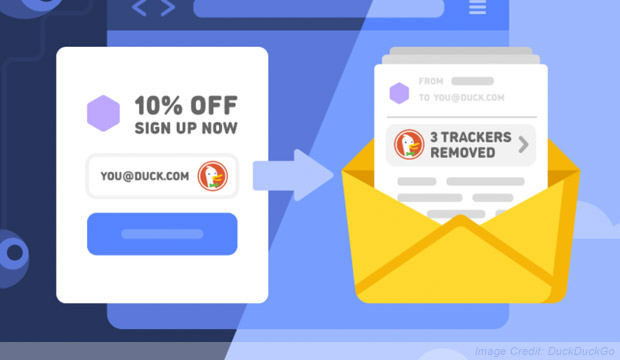Consumer privacy champion DuckDuckGo on Tuesday announced that it’s rolling out a beta version of a feature in its mobile and desktop applications that will strip trackers from its users’ incoming email.
Called Email Protection, the feature will be initially distributed through a waiting list that anyone can add their name to.
Consumers chosen from the list will be able to create a free, personal @duck.com email address. Email sent to the @duck address will be denuded of trackers before being forwarded to a consumer’s primary email address.
“Reading your email should be a private activity,” DuckDuckGo declared in its Spread Privacy blog.
“You may be surprised to learn that 70 percent of emails contain trackers that can detect when you’ve opened a message, where you were when you opened it, and what device you were using,” it explained.
“If that isn’t creepy enough,” it added, “this email data can be used to profile you, including to target you with ads, and influence the content you see online.”
Disposable Email Addresses
According to DuckDuckGo, its approach to removing trackers from email has some advantages over competing services. For example, users don’t have to switch email services to use it, nor do they have to lose all the images in an incoming email.
A personal Duck address can be used anywhere a consumer would use an email address on the internet. That can be handy for withholding a primary address from a website that’s suspected of generating spam or sharing addresses with marketers.
“Since it’s common for sites to upload your email address to Google and Facebook for ad targeting, or for your email to be leaked in a data breach, this extra level of identity protection is now unfortunately necessary,” DuckDuckGo blogged.
“You can think of it as similar to not reusing the same password everywhere,” it added.
Duck addresses don’t have to be reused because new ones can be created on demand, and they can be deactivated just as easily.
DuckDuckGo emphasized that it will never save any user’s email being processed by Email Protection. As mail passes through the company’s servers, it’s stripped of trackers and sent directly to its destination without being saved.
Fairly Innocuous
Email trackers are often used by marketers to measure the effectiveness of their email campaigns.
“They provide marketers with visibility on who’s opening their emails when they’re being opened, the device being used, where and whether users are engaging with links or attachments,” explained Greg Sterling, vice president of market insights at Uberall, a maker of location marketing solutions based in Berlin.
“Email tracking can be used for ad retargeting as well,” he told TechNewsWorld.
“Along with commercial use cases, organizations can use trackers or read receipts to see if employees, customers or partners are paying attention to important messages and announcements,” added Charles King, the principal analyst with Pund-IT, a technology advisory firm in Hayward, Calif.
“The value to end users is less clear,” he told TechNewsWorld.
Liz Miller, vice president and a principal analyst at Constellation Research, a technology research and advisory firm in Cupertino, Calif., explained that trackers are primarily used to track performance and not obtain sensitive data.
“They allow marketers to see tracking details about the fundamentals of an email campaign’s performance,” she told TechNewsWorld. “They haven’t been a way for marketers to pull in information in the same way that cookies or other solutions pull in behavioral data,” she continued.
“They’re fairly innocuous, but in a world where DuckDuckGo is looking to increase its share of the search market, stripping trackers is another enhancement that tells consumers there’s one less privacy thing to worry about in DuckDuckGo,” she added.
Privacy Threat?
Miller maintained that DuckDuckGo is taking aim at trackers because privacy is part of its brand. “It sees email tracking as a malicious attack against privacy, so it’s going to block it,” she said.
King noted that enabling blocking by default is a product differentiator for DuckDuckGo. “It means users have one less thing to think about,” he observed.
“That said,” he continued, “there are numerous other ways to block trackers, so I’m not sure how valuable it will be to the company’s business.”
Sterling added, “DuckDuckGo’s new feature may attract new users and further associate their brand with consumer privacy, which is their broad value proposition.”
Are trackers a threat to privacy?
“In some cases, yes,” Sterling said, “by capturing user data and potentially disseminating it.”
Broadly speaking, King added, trackers qualify as a personalized surveillance tool that some users consider invasive.
“Additionally,” he continued, “many trackers utilize HTML, which often plays a role in privacy leaks. The Electronic Freedom Foundation recommends disabling the use of HTML in inboxes, which also effectively disables most trackers.”
Miller maintained, however, that whether email trackers are a threat to privacy depends on whom you ask.
“For the average DuckDuckGo user who sees anything pulled in about them as a threat to privacy, they’re absolutely a threat,” she said.
“But by and large, if they are a threat, they’re a minor one, if anything,” she contended. “I haven’t seen any implementations of email tracking that is truly privacy alarming.”
“There are those people who think any intrusion is chipping away at the fabric of privacy,” she continued, “and the industry has to be sensitive to that reaction. That’s where you see applications like DuckDuckGo making a name for themselves.”
“Do I think email tracking is an invasion of my privacy? No,” she added. “Does my husband, who is a DuckDuckGo user? Absolutely.”
Marketers Remain Resilient
DuckDuckGo’s Email Protection feature is just the latest move by some industry players, such as Apple, to give consumers more tools to protect their privacy at the expense of marketers. However, those expenses don’t seem to be too high yet.
“The negative impact doesn’t appear to be sizable, let alone huge,” King observed.
“For years, various vendors have developed impediments to protect end users,” he continued. “So long as marketers and other interests find value in users’ sentiments and behavior, they will find ways over, under, or around those barriers.”
“This is part of an arms race,” said Russell Newman, associate professor at the Marlboro Institute for Liberal Arts & Interdisciplinary Studies at Emerson College in Boston.
“As soon as an entity like DuckDuckGo creates a wall, folks start constructing ladders to get over the wall,” he told TechNewsWorld.
“We’re all being given these new tools that kind of give us a bit of control,” he added, “but it’s a form of control that’s really quite minimal and not really the answer to the broader question about privacy that we’re facing right now, which is should this data be collected in the first place.”























































